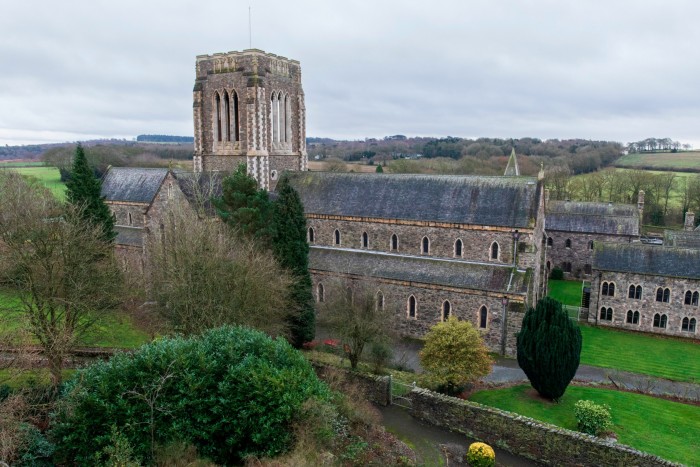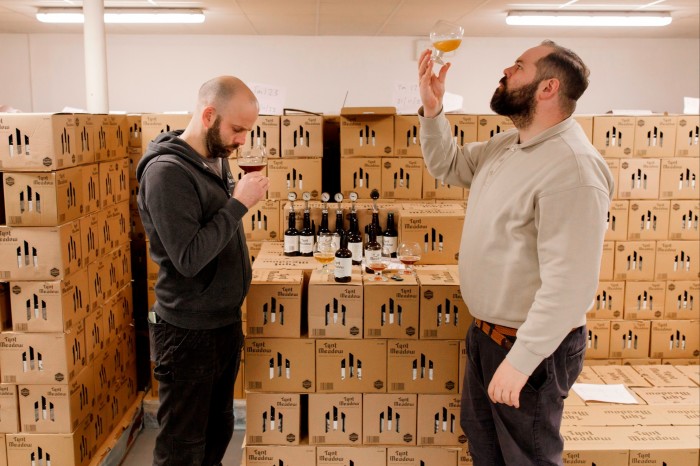Unlock the Editor’s Digest for free
Roula Khalaf, Editor of the FT, selects her favourite stories in this weekly newsletter.
Shortly after noon every day, the monks of Mount St Bernard, nestled in a shallow valley in rural Leicestershire, pause their brewing and bottling and head to the abbey for midday prayer.
When Father Joseph Delargy arrived 37 years ago, the monastery near the town of Coalville supported itself with an in-house dairy farm. Today, as abbot, he oversees the production of Britain’s only Trappist ale: Tynt Meadow, a strong, multi-award-winning beer that flies off the shelves in their warehouse every Christmas.
“You can’t rush it. It happens in its own time, it happens in God’s time,” said Delargy, 62, adding that the slow and silent work of making the tipple made it a fitting addition to the contemplative nature of monastic life.
Since it was launched in 2017, demand for Tynt Meadow has surged. With orders coming in from as far afield as Mexico, the brewery has hired its first few specialist staff and marginally increased its yield for the craft ale, now close to 105,000 litres a year.
While Trappist beer is well established in mainland Europe — where there are 13 breweries, all tied to monasteries of the Catholic religious order — Mount St Bernard is the sole UK-based producer.
Nevertheless, it is fast gaining ground on overseas counterparts. Thanks in part to the wider craft ale boom, exports to the Netherlands and Belgium, which is home to six of the 13 breweries, now account for more than half of sales.
Tynt Meadow, named after the plot of land on which the monastery was founded in 1835, has an alcohol percentage by volume (ABV) of 7.4 per cent. Brewed where monks once washed their clothes, cooked their meals and ate, the dark drink made from English ingredients tastes heavily of peat and chocolate, and retails from £3.30 per 330ml bottle.
“[Mainland Europeans] are the experts but they want our beer,” said Delargy. “I hope somehow that when people are drinking that they’re taking some of the spirit of the monastery with them.”
Mount St Bernard’s brewing operation is in some ways a return to its roots. After modern farming methods and fierce milk pricing left the dairy farm unviable and their home near closure, the monks turned to booze to achieve financial stability, taking inspiration from their predecessors who made beer in the 19th century.
The monastery is now back on a firm financial footing, but both Delargy and brewery manager Peter Grady stressed that profits were used only to pay for its upkeep. Any surplus goes to charities in the local community.
“This is a monastery with a brewery. They [the monks] don’t want it to be a brewery with a monastery,” said Grady. But “without the brewery . . . they would just run their reserves down”.

Grady — who came on board during the pandemic to help the monks balance their religious duties with the growing business — added that although more alcohol could be produced and the price of Tynt Meadow raised significantly, the monastery had an obligation to ensure its products were affordable.
Like many other businesses over the past two years, Mount St Bernard has been hit by rising costs and tighter margins because of the surge in inflation. The commitment to fair prices has left Grady with little wriggle room.
“Our margins have got squeezed in the past few years, because everything’s gone up. The malt went up 42 per cent. I can’t increase the price of the beer by 42 per cent,” he said.

Although demand tends to slump in the summer, it peaks in the lead up to Christmas as consumers begin buying presents for friends and family. The brewery expects to sell 25-33 per cent of what it has produced over the past year in the six weeks to December 25.
In a push to boost sales at other times of the year and draw new customers, Mount St Bernard will next Easter launch a fruitier “blonde” Trappist beer with an ABV of 5 per cent. Ross Adams, head brewer, said: “7.4 per cent doesn’t really suit British drinking culture.”
Grady, who ran a bar before losing his job when Covid struck, noted that while the stability of the brewery and its sales meant stability for Mount St Bernard, religious and business life did not always dovetail.
“They [the monks] say to me, ‘There’s nothing that can’t wait til tomorrow’,” he said. “They’re seeing it from the monastic point of view, not from a commercial point of view. There’s no brewery without the monastery, and there’s no monastery without the brewery.”
Credit: Source link



